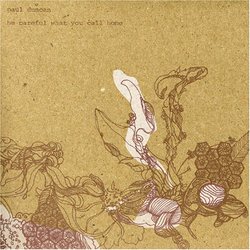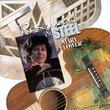| All Artists: Paul Duncan Title: Be Careful What You Call Home Members Wishing: 1 Total Copies: 0 Label: Hometapes Original Release Date: 11/8/2005 Release Date: 11/8/2005 Genres: Alternative Rock, Folk, Pop, Rock Styles: Indie & Lo-Fi, Singer-Songwriters Number of Discs: 1 SwapaCD Credits: 1 UPCs: 880270048427, 0880270048427 |
Search - Paul Duncan :: Be Careful What You Call Home
 | Paul Duncan Be Careful What You Call Home Genres: Alternative Rock, Folk, Pop, Rock
Paul Duncan was born and raised in East Texas, schooled in Savannah, GA, and called Atlanta home before moving to Brooklyn in 2003. This web across the American map made for the early construction of Paul's complex and sel... more » |
Larger Image |
CD DetailsSynopsis
Product Description Paul Duncan was born and raised in East Texas, schooled in Savannah, GA, and called Atlanta home before moving to Brooklyn in 2003. This web across the American map made for the early construction of Paul's complex and self-made history in song. Living rooms became studios, scrap wood became vocal booths, and open windows yielded a sea of sound. The racket of everyday melded with the skilled hand of a multi-instrumentalist. At age 26 and in the flurry of NYC, Paul has created Be Careful What You Call Home. His 2003 debut, To An Ambient Hollywood, introduced a multi-faceted musician and vocalist ? and perhaps a mysterious voice from the South. While Indie Workshop called it, ?a beautiful soft-shoed singer songwriter album full of fleshed out, full bloom songs? and Fake Jazz saw its ?influence from electronic, progressive music like Brian Eno and Talk Talk,? Paul Duncan was well on his way to an entirely new document. A mental score. A geographical response. The architecture of Be Careful What You Call Home belongs almost anywhere, but it found itself at the source: ?I began by wanting to hear and experience things that might take me out of a small town mentality ? and I realized that small town experience is something that makes me exist,? Paul said. Like its precedent, Be Careful What You Call Home is home-made with a range of musical ingredients. Self-taught, Paul utilizes guitar, bass, piano, electronics, cello, drums, etc. His move to New York reunited him with longtime friends/musicians and introduced him to new ones, enabling him to create an ensemble for live performance and for accompaniment on recordings. Claudia Deheza (of the late On Air Library and longtime collaborator with Scott Herren in Savath and Savalas and with Prefuse 73) has workedclosely with Paul over the past few months, lending her voice to live performances and to an upcoming limited 7? release. Joe Stickney, an Alabama-born painter and drummer, provides percussion (as he does for Eastern Developments? Bear In Heaven, as well). Adam Wills (also of Bear In Heaven), who is working on a video from Be Careful What You Call Home, plays guitar. James Elliot (part of the label Antiopic with his own release under the name Ateleia) plays bass. The translation into live performance has added a dimension to Paul?s entire process ? one more confident and apt to embrace the very avant-pop dynamics that set him apart. Introduced to and compelled by the likes of Luc Ferrari, Morton Feldman, Arnold Dreyblatt, et al while studying sound design in college, Paul took to a language that combined with his own real and imaginary scenarios. ?A drunk uncle and his third wife, a love that never happened, a death that I?ve dealt with?? he lists. The cerebral and the emotional come crashing, existing in a balance characterized by Paul in references to his reading habits, where Hans Bellmer and Knut Hamson exist side-by-side. Be Careful What You Call Home comes complete with a lyric book, allowing words to accompany the record?s inherent sonic storytelling. Despite this lyrical reveal, which might convey a desire tocommunicate beyond the sole power of the recorded uttered voice, Paul said, ?There's a brevity to some of the songs on the new album for a reason - some of those songs don't have a long life.? He compares the thirteen tracks to ?fleeting thoughts or feelings, things that I wouldn't indulge in for more than a little while. I?m writing about things that are beyond me because I don't know enough yet. They're sketches of things we all try to figure out.? Paul Duncan has collected many comparisons ? from The Sea and Cake, Nick Drake, and Iron and Wine to specific works by Eno and to the varied nature of Jim O?Rourke. He hovers in good company, but stands alone at the end of the day in his recency, offering something best described by the bigger picture of everyday life. Perhaps more interesting about Be Careful What You Call Home is the light it sheds on the Similar CDs
|
CD ReviewsNice little electro - acoustic folk album somethingexcellent | Lincoln, NE United States | 11/24/2005 (4 out of 5 stars) "Paul Duncan creates hushed folk rock music by way of modern digital experimentation. His second album Be Careful What You Call Home mixes nearly equal parts lush acoustic instrumentation and sonic noodling by way of Christian Fennesz. In fact, one the closest comparisons musically might be another musician who creates somewhat similar-sounding work, and who has released digitally-deconstructed experiments with Fennesz himself, namely Jim O'Rourke. Another part of the comparison is probably because of the breathy, multi-tracked vocals of Duncan on many tracks, but that will be explained further. Duncan has a little bit of help from friends on the release, including Claudia Deheza (who was in On Air Library and has also worked with Prefuse 73 recently), and Bear In Heaven artists Joe Stickney and Adam Wills. The result is an varied batch of tracks from the young artist that works most of the time, and even when it doesn't, it's ambitious at the very least. "In A Way" opens the release with muffled percussion and some gorgeous guitar melodies that wrap around chimes and the multi-tracked vocals of Duncan. At two minutes, the track is far too short, but as with several other places on the release, it actually leaves you wanting a bit more rather than wearing you down. The Jim O'Rourke reference comes into full play on "Tired And Beholden" as some sparse piano melodies mix in alongside acoustic and electronic guitar, synths, crisp drumming, and male/female vocal harmonies. One can even hear a bit of the Super Furry Animals in the mid-tempo rhodes-rock of "Oil In The Fields" while "Toy Bass" is breezy, yet somewhat driving instrumental pop by way of the windy city. In places, the album seems to get a bit bogged down with random sonic experiments. Neither "Toy Bell" and "Aria (Cave Song)" are by any means annoying or bad, but the former is yet another take on processed bells, while the latter is simply a couple minutes of guitar noodles that don't really go much of anywhere. In other places, though, the album seems to burst into new territory altogether, as with the stuttering, crisp "Content To Burn," which perfectly mixes the electronic and organic elements into a short, hummable track that once again feels too short. With thirteen tracks running under forty five minutes in length, Be Careful What You Call Home is a polished second release from the young songwriter (with beautiful packaging as usual from the Hometapes label). (from almost cool music reviews)" Another good electronic-tinged indie rock record which nobod C. Cross | 01/06/2006 (4 out of 5 stars) "Paul Duncan's "Be Careful What You Call Home" is but another in a slew of good (electronic-tinged) indie rock albums this year that probably nobody will ever hear. It's a shame, too, because Paul Duncan is very good at what he does - his voice, his instrumentation, his lyrics...they're all well done. "Tired & Beholden" is also a pretty hitworthy track (one of my indie rock favorites of this year). Not every song is as catchy as this one, but they're ALL very interesting to listen to. He sometimes uses some kid's instruments which creates some odd-yet-curious songs (which are suitably named "Toy Bell", "Toy Piano" and "Toy Bass"). It's just a very creative album. Except for "Tired & Beholden", I'm not sure if it will appeal to most people. Indie rock fans and the open-minded, however, will no doubt like this album. Highly recommended! Highlights include: "In A Way" "Tired & Beholden" "Oil In The Fields" "Content To Burn" the rest are good, too" A Pleasant Discovery, A Promising Artist Tom Ferguson | Chickamauga, GA | 05/08/2006 (4 out of 5 stars) "A friend of mine loaned this album to me. I was immediately impressed by Mr. Duncan's musical and vocal talents. Obviously influenced by Gastr del Sol and other avant garde performers, his recordings are, fortunately, additionally infused with a sense of longing not typical to the genre. As a fellow Southerner/lifelong small-town resident, I'm convinced that it is his particular life experiences that enrich his compositions with the aforementioned emotional depth, a unique Southern yearning. All he needs to do now is to hone his lyrics, upon which he will be a truly formidable recording artist."
|

 Track Listings (13) - Disc #1
Track Listings (13) - Disc #1